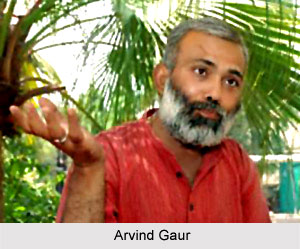 Arvind Gaur, the Indian theatre director, is known for his work in original, socially and politically significant theatre. Arvind Gaur`s plays are contemporary and thought provoking. The message of his plays often links to intimate personal spheres of existence to larger social political issues. The works of Arvind Gaur relates to communalism, Crime of State, injustice, social discrimination, caste issues, Politics of power, feudalism, and domestic violence, violence, marginalisation and racism. He is the leader of Delhi`s one of the most popular theatre group and is also an actor, trainer, social activist, and storyteller.
Arvind Gaur, the Indian theatre director, is known for his work in original, socially and politically significant theatre. Arvind Gaur`s plays are contemporary and thought provoking. The message of his plays often links to intimate personal spheres of existence to larger social political issues. The works of Arvind Gaur relates to communalism, Crime of State, injustice, social discrimination, caste issues, Politics of power, feudalism, and domestic violence, violence, marginalisation and racism. He is the leader of Delhi`s one of the most popular theatre group and is also an actor, trainer, social activist, and storyteller.
Early Life of Arvind Gaur
Arvind Gaur was born on 2nd February, 1963 in Delhi to Shri Shiv Nandan who is a retired Maths teacher and mother Mrs. Saraswati Devi. Arvind Gaur`s wife Dr. Sangeeta Gaur is a talented vocalist, composer and music director and they together have twin daughters Kakoli and Saveree.
Career in Theatre for Arvind Gaur
Arvind Gaur was the recipient of a research fellowship awarded by the Ministry of Human Resource Development (India). He is the guest faculty of Delhi University for Theatre in education program for three years. He has conducted many theatre workshops and also he himself performed in various colleges, institutions, universities and schools in India and abroad. Arvind Gaur has organized theatre workshops for children in schools and slums as well as street theatre performances, where the plot was based on different socio-political issues. He has directed more than 60 stage plays for more than two decades.
Arvind Gaur has directed Girish Karnad`s Tughlaq Translations by B. V. Karanth, Surekha Sikri and K.K. Nayyar, Bhisham Sahni`s Hanoosh, Dharamvir Bharati `s Andha Yug, Swadesh Deepak`s Court Martial and many more performing slots. With passing years, Arvind Gaur became a name whose works were categorized as something different from other thaetre works. He followed with Govind Deshpande`s Antim Divas, Albert Camus`s Caligula (play), Girish Karnad `s Rakt Kalyan (Taledanda), Bertolt Brecht`s Caucasian chalk Circle, Mahesh Dattani`s Final Solutions, Eugene O`Neill`s Desire under the Elms translated by Nadira Babbar. Arvind Gaur also assisted Shri Habib Tanvir during the Prithvi Theatre Festival, Mumbai.
Arvind Gaur`s Naya Theatre performed seven Productions in this Festival, from a revival of Habib Tanvir`s first major production, "Agra Bazaar" that dates back to 1954, to the new "Zahreeli Hawa" based on the Bhopal gas tragedy.
Arvind Gaur also did some solo play direction like Story of the Tiger, solo with Jaimini Kumar Srivastava, Women in Black, Untitled, solo with Lushin Dubey, Bhisham Sahni `s Madhavi solo play with Rashi Bunny and many others. Arvind Gaur designs lights for NAYA Theatre`s major productions under the Direction of Padma Shri Habib Tanvir. The plays of Arvind Gaur are powerful artistic statements.
Some celebrated works by Arvind Gaur are as follows -
| Dario Fo`s Operation Three Star |
Mahesh Dattani`s Tara |
Dr. Harish Naval`s Peeli Chht par Kaala Nissan |
| Dr.Narenda Mohan `s Kalandar and Mr.Jinna |
Samuel Beckett`s Waiting For Godot |
Bhisham Sahni `s Kabira (Kabir) kheda Bazar Mai |
| John Octanasek`s Romeo Juliet and the darkness |
Munshi Premchand`s Mote ram ka Satyagrah |
Bharatendu Harishchandra`s Andher Nagri |
| Neil Simon`s The Good Doctor |
Bertolt Brecht`s The Good Person of Szechwan (Ramkali-Good woman of Delhi) |
Doodnath Singh`s Yama Gatha |
| Sharad Joshi`s Andhon ka Hathi and Ek tha Gadha urf aladat Khan |
Nag Bodas`s Amma Tujhe salaam |
Uday Prakash`s Warren Hastings ka Saand |
| Ashok Lal`s Ek Mamooli Aadmi |
Rajesh Kumar`s Me Gandhi Bolto |
Mahesh Dattani`s 30 Days in September |
| Vijay Tendulkar"s Ghashiram Kotwal |
Vijay Mishra"s Tatt Niranjana |
Harsh Mander`s Unsuni |
Awards received by Arvind Gaur
| Artistes 4 Change Karmaveer Puraskaar Noble Laureates,2008 |
Radha Krishna Award for his contribution to Delhi"s art & culture,2007 |
Special Jury award for best play in experimentation with tradition the at International |
Swar-Dhrohar award ,2007 |
| Solo Theatre Festival, Armenia,2004 |
Solo Play Madhavi by Rashi Bunny,2005 |
Colour of Nation Award at International Theatre Festival |
Udhbhav Shikhar Samman (In memory of Aacharya Vijyendra Sanathak),2008 |
 Arvind Gaur, the Indian theatre director, is known for his work in original, socially and politically significant theatre. Arvind Gaur`s plays are contemporary and thought provoking. The message of his plays often links to intimate personal spheres of existence to larger social political issues. The works of Arvind Gaur relates to communalism, Crime of State, injustice, social discrimination, caste issues, Politics of power, feudalism, and domestic violence, violence, marginalisation and racism. He is the leader of Delhi`s one of the most popular theatre group and is also an actor, trainer, social activist, and storyteller.
Arvind Gaur, the Indian theatre director, is known for his work in original, socially and politically significant theatre. Arvind Gaur`s plays are contemporary and thought provoking. The message of his plays often links to intimate personal spheres of existence to larger social political issues. The works of Arvind Gaur relates to communalism, Crime of State, injustice, social discrimination, caste issues, Politics of power, feudalism, and domestic violence, violence, marginalisation and racism. He is the leader of Delhi`s one of the most popular theatre group and is also an actor, trainer, social activist, and storyteller.




















